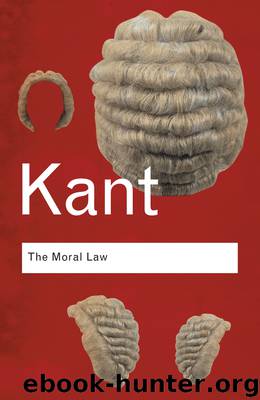The Moral Law by Kant Immanuel

Author:Kant, Immanuel
Language: eng
Format: epub
Publisher: Taylor and Francis
[How are Imperatives Possible?]
The question now arises ‘How are all these imperatives possible?’ This question does not ask how we can conceive the execution of an action commanded by the imperative, but merely how we can conceive the necessitation of the will expressed by the imperative in setting us a task.20 How an imperative of skill is possible requires no special discussion. Who wills the end, wills (so far as reason has decisive influence on his actions) also the means which are indispensably necessary and in his power. So far as willing is concerned, this proposition is analytic: for in my willing of an object as an effect there is already conceived21 the causality of myself as an acting cause—that is, the use of means; and from the concept of willing an end the imperative merely extracts the concept of actions necessary to this end. (Synthetic propositions are required in order to determine the means to a proposed end, but these are concerned, not with the reason for performing the act of will, but with the cause which produces the object.) That in order to divide a line into two equal parts on a sure principle I must from its ends describe two intersecting arcs—this is admittedly taught by mathematics only in synthetic propositions; but when I know that the aforesaid effect can be produced only by such an action, the proposition ‘If I fully will the effect, I also will the action required for it’ is analytic; for it is one and the same thing to conceive something as an effect possible in a certain way through me and to conceive myself as acting in the same way with respect to it.
If it were only as easy to find a determinate concept of happiness, the imperatives of prudence would agree entirely with those of skill and would be equally analytic. For here as there it could alike be said ‘Who wills the end, wills also (necessarily, if he accords with reason) the sole means which are in his power’. Unfortunately, however, the concept of happiness is so indeterminate a concept that although every man wants to attain happiness, he can never say definitely and in unison with himself what it really is that he wants and wills. The reason for this is that all the elements which belong to the concept of happiness are without exception empirical—that is, they must be borrowed from experience; but that none the less there is required for the Idea of happiness an absolute whole, a maximum of well-being in my present, and in every future, state. Now it is impossible for the most intelligent, and at the same time most powerful, but nevertheless finite, being to form here a determinate concept of what he really wills. Is it riches that he wants? How much anxiety, envy, and pestering might he not bring in this way on his own head! Is it knowledge and insight? This might perhaps merely give him an eye so
Download
This site does not store any files on its server. We only index and link to content provided by other sites. Please contact the content providers to delete copyright contents if any and email us, we'll remove relevant links or contents immediately.
The remains of the day by Kazuo Ishiguro(7609)
Tools of Titans by Timothy Ferriss(7010)
The Black Swan by Nassim Nicholas Taleb(6246)
Giovanni's Room by James Baldwin(5947)
Inner Engineering: A Yogi's Guide to Joy by Sadhguru(5936)
The Way of Zen by Alan W. Watts(5836)
The Six Wives Of Henry VIII (WOMEN IN HISTORY) by Fraser Antonia(4821)
The Power of Now: A Guide to Spiritual Enlightenment by Eckhart Tolle(4802)
Astrophysics for People in a Hurry by Neil DeGrasse Tyson(4646)
Asking the Right Questions: A Guide to Critical Thinking by M. Neil Browne & Stuart M. Keeley(4633)
12 Rules for Life by Jordan B. Peterson(3788)
The Ethical Slut by Janet W. Hardy(3541)
Skin in the Game by Nassim Nicholas Taleb(3508)
Housekeeping by Marilynne Robinson(3449)
The Art of Happiness by The Dalai Lama(3415)
Double Down (Diary of a Wimpy Kid Book 11) by Jeff Kinney(3310)
Skin in the Game: Hidden Asymmetries in Daily Life by Nassim Nicholas Taleb(3295)
Walking by Henry David Thoreau(3256)
12 Rules for Life: An Antidote to Chaos by Jordan B. Peterson(3221)
